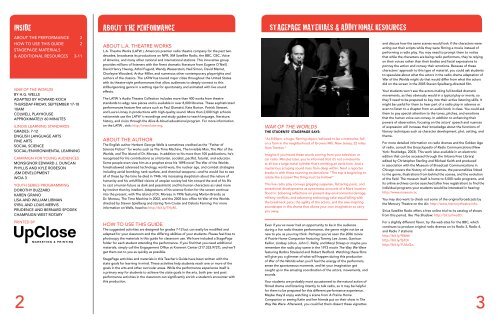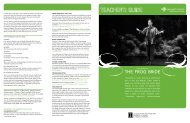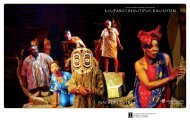War of the Worlds
Teacher's Guide - Krannert Center Youth Series
Teacher's Guide - Krannert Center Youth Series
- No tags were found...
Create successful ePaper yourself
Turn your PDF publications into a flip-book with our unique Google optimized e-Paper software.
inside<br />
about <strong>the</strong> performance<br />
stagepage materials & additional resources<br />
about <strong>the</strong> performance 2<br />
how to use this guide 2<br />
stagepage materials<br />
& additional resources 3-11<br />
war <strong>of</strong> <strong>the</strong> worlds<br />
by H.G. Wells<br />
adapted by howard koch<br />
thursday-friday, September 17-18<br />
10am<br />
colwell playhouse<br />
approximately 60 minutes<br />
ILINOIS LEARNING STANDARDS<br />
Grades: 7-12<br />
English Language Arts<br />
Fine Arts<br />
Social Science<br />
Social/Environmental Learning<br />
campaign for young audiences<br />
Monsignor Edward J. Duncan<br />
Phyllis and Kyle Robeson<br />
JSM Development<br />
WCIA 3<br />
youth series programming<br />
Dorothy Buzzard<br />
Karen Grano<br />
Lisa and William Libman<br />
Sybil and Louis Mervis<br />
Prudence and Bernard Spodek<br />
Champaign West Rotary<br />
about l.a. <strong>the</strong>atre works<br />
L.A. Theatre Works (LATW ), America’s premier radio <strong>the</strong>atre company for <strong>the</strong> past two<br />
decades, broadcasts its productions on NPR, XM Satellite Radio, <strong>the</strong> BBC, CBC, Voice<br />
<strong>of</strong> America, and many o<strong>the</strong>r national and international stations. This innovative group<br />
provides millions <strong>of</strong> listeners with <strong>the</strong> finest dramatic literature from Eugene O’Neill,<br />
David Henry Hwang, Athol Fugard, Wendy Wasserstein, Neil Simon, David Mamet,<br />
Charlayne Woodard, Arthur Miller, and numerous o<strong>the</strong>r contemporary playwrights and<br />
authors <strong>of</strong> <strong>the</strong> classics. The LATW has toured major cities throughout <strong>the</strong> United States<br />
with its <strong>the</strong>atre-style performances that allow audiences to deeply connect to this<br />
stillburgeoning genre in a setting ripe for spontaneity and animated with live sound<br />
effects.<br />
The LATW ’s Audio Theatre Collection includes more than 400 works from <strong>the</strong>atre<br />
standards to edgy new pieces and is available in over 8,000 libraries. These sophisticated<br />
performances feature fine actors such as Paul Giamatti, Kate Burton, Patrick Stewart,<br />
and Laura Linney in productions with high-quality sound. More than 2,000 high schools<br />
nationwide use <strong>the</strong> LATW ’s recordings and study guides to teach language, literature,<br />
history, and civics through <strong>the</strong> Alive & Aloud educational program. For more information<br />
on <strong>the</strong> LATW , visit: http://www.latw.org.<br />
about <strong>the</strong> author<br />
The English author Herbert George Wells is sometimes credited as <strong>the</strong> “Fa<strong>the</strong>r <strong>of</strong><br />
Science Fiction” for works such as The Time Machine, The Invisible Man, The <strong>War</strong> <strong>of</strong> <strong>the</strong><br />
<strong>Worlds</strong>, and The Island <strong>of</strong> Dr. Moreau. In addition to his more than 100 publications, he’s<br />
recognized for his contributions as a historian, socialist, pacifist, futurist, and educator.<br />
Some people even view him as a prophet since his 1898 novel The <strong>War</strong> <strong>of</strong> <strong>the</strong> <strong>Worlds</strong><br />
foreshadowed advanced technology, world wars, <strong>the</strong> nuclear age, and combat strategies<br />
including aerial bombing, tank warfare, and chemical weapons—and he would live to see<br />
all <strong>of</strong> <strong>the</strong>se by <strong>the</strong> time he died in 1946. His increasing skepticism about <strong>the</strong> nature <strong>of</strong><br />
humanity and his unfulfilled visions <strong>of</strong> utopian society led him toward <strong>the</strong> end <strong>of</strong> his life<br />
to cast a human future as dark and pessimistic and his human characters as ruled more<br />
by instinct than by intellect. Adaptations <strong>of</strong> his science fiction for <strong>the</strong> screen continue<br />
into <strong>the</strong> present, with The Island <strong>of</strong> Dr. Moreau in 1996 featuring Marlon Brando as<br />
Dr. Moreau, The Time Machine in 2002, and <strong>the</strong> 2005 box <strong>of</strong>fice hit <strong>War</strong> <strong>of</strong> <strong>the</strong> <strong>Worlds</strong><br />
directed by Steven Spielberg and staring Tom Cruise and Dakota Fanning. For more<br />
information on Wells, head to: http://bit.ly/ThlyM.<br />
war <strong>of</strong> <strong>the</strong> worlds<br />
The students’ StagePage says:<br />
“At 8:50pm, a huge, flaming object, believed to be a meteorite, fell<br />
on a farm in <strong>the</strong> neighborhood <strong>of</strong> Grovers Mill, New Jersey, 22 miles<br />
from Trenton.”<br />
Imagine if you heard <strong>the</strong>se words coming from your television or<br />
car radio. Minutes later, you’re informed that it’s not a meteorite<br />
at all but a large metal cylinder that’s emitting an eerie hum. And a<br />
mysterious scraping sound rises from deep within. Next a reporter<br />
breaks in with <strong>the</strong>se stunning exclamations: “The top is beginning to<br />
rotate like a screw! The thing must be hollow!”<br />
This live radio play conveys gripping suspense, fluttering panic, and<br />
sensational developments as eyewitness accounts <strong>of</strong> a Mars invasion<br />
flood in. Sobering reflections on present-day environmental damage,<br />
military conflicts, and advancing technology take equal billing with<br />
<strong>the</strong> breakneck pace, <strong>the</strong> agility <strong>of</strong> <strong>the</strong> actors, and <strong>the</strong> awe-inspiring<br />
soundscape in this drama that allows your own imagination to carry<br />
you away.<br />
and discuss how <strong>the</strong> same scenes would look if <strong>the</strong> characters were<br />
acting out <strong>the</strong>ir scripts while <strong>the</strong>y were filming a movie instead <strong>of</strong><br />
performing a radio play. You may need to prompt <strong>the</strong>m to notice<br />
that while <strong>the</strong> characters are being radio performers, <strong>the</strong>y’re relying<br />
on <strong>the</strong>ir voices ra<strong>the</strong>r than <strong>the</strong>ir bodies and facial expressions to<br />
portray <strong>the</strong> action and convey <strong>the</strong>ir emotions. Because <strong>of</strong> <strong>the</strong>se<br />
characters’ approach to this type <strong>of</strong> material, you could ask students<br />
to speculate about what <strong>the</strong> actors in <strong>the</strong> radio drama adaptation <strong>of</strong><br />
<strong>War</strong> <strong>of</strong> <strong>the</strong> <strong>Worlds</strong> might do that would differ from what <strong>the</strong> actors<br />
did on <strong>the</strong> screen in <strong>the</strong> 2005 Steven Spielberg-directed film.<br />
Your students won’t see <strong>the</strong> actors making full-bodied dramatic<br />
movements, as <strong>the</strong>y obviously would in a typical play or movie, so<br />
<strong>the</strong>y’ll need to be prepared to key into <strong>the</strong>ir active listening skills. It<br />
might be useful for <strong>the</strong>m to hear part <strong>of</strong> a radio play in advance or<br />
even to listen to a chapter from an audio book in class. You could ask<br />
<strong>the</strong>m to pay special attention to <strong>the</strong> tones, pitches, and emotions<br />
that <strong>the</strong> human voice can convey. In addition to enhancing <strong>the</strong>ir<br />
powers <strong>of</strong> observation, focusing on <strong>the</strong> actors’ speech and nuances<br />
<strong>of</strong> expression will increase <strong>the</strong>ir knowledge about <strong>the</strong> functions <strong>of</strong><br />
literary techniques such as character development, plot, setting, and<br />
<strong>the</strong>me.<br />
For more detailed information on radio dramas and <strong>the</strong> Golden Age<br />
<strong>of</strong> radio, consult <strong>the</strong> Encyclopedia <strong>of</strong> Radio Communications (New<br />
York: Routledge, 2003). This work (also available in an electronic<br />
edition that can be accessed through <strong>the</strong> Urbana Free Library)<br />
edited by Christopher Sterling and Michael Keith and produced<br />
in association with <strong>the</strong> Museum <strong>of</strong> Broadcast Communications in<br />
Chicago covers <strong>the</strong> history <strong>of</strong> radio dramas, <strong>the</strong> personalities linked<br />
to <strong>the</strong> genre, illustrations from behind <strong>the</strong> scenes, and <strong>the</strong> evolution<br />
<strong>of</strong> <strong>the</strong> field. The museum itself is home to 5,000 radio programs, and<br />
its online archives can be searched (after free registration) to find <strong>the</strong><br />
individual programs your students would be interested in hearing:<br />
http://www.museum.tv.<br />
You may also want to check out some <strong>of</strong> <strong>the</strong> original broadcasts by<br />
<strong>the</strong> Mercury Theatre on <strong>the</strong> Air: http://www.mercury<strong>the</strong>atre.info.<br />
Sirius Satellite Radio <strong>of</strong>fers a free online trial to its catalog <strong>of</strong> shows<br />
from this period, like The Shadow: http://bit.ly/fwa3D.<br />
printed by<br />
2<br />
how to use this guide<br />
The suggested activities are designed for grades 7-12 but can easily be modified and<br />
adapted for your classroom and <strong>the</strong> differing abilities <strong>of</strong> your students. Please feel free to<br />
photocopy <strong>the</strong> materials in this guide for classroom use. We have included a StagePage<br />
folder for each student attending <strong>the</strong> performance. If you find that you need additional<br />
materials, simply call <strong>the</strong> Engagement Office at Krannert Center (217.333.9727), and we’ll<br />
get <strong>the</strong>m out to you as quickly as possible.<br />
StagePage activities and materials in this Teacher’s Guide have been written with <strong>the</strong><br />
state goals for learning in mind. These activities help students reach one or more <strong>of</strong> <strong>the</strong><br />
goals in <strong>the</strong> arts and o<strong>the</strong>r curricular areas. While <strong>the</strong> performance experience itself is<br />
a primary way for students to achieve <strong>the</strong> state goals in <strong>the</strong> arts, both pre- and post<br />
performance activities in <strong>the</strong> classroom can significantly enrich a student’s encounter with<br />
this production.<br />
Even if you’ve never had an opportunity to be in <strong>the</strong> audience<br />
during a live radio <strong>the</strong>atre performance, <strong>the</strong> genre might not be as<br />
new to you as you may think. Perhaps you’ve seen <strong>the</strong> 2006 movie<br />
A Prairie Home Companion featuring Tommy Lee Jones, Garrison<br />
Keillor, Lindsay Lohan, John C. Reilly, and Meryl Streep or maybe you<br />
remember <strong>the</strong> radio play scene in <strong>the</strong> 1973 movie The Way We Were<br />
featuring Barbra Streisand and Robert Redford. Watching <strong>the</strong>se films<br />
will give you a glimmer <strong>of</strong> what will happen during this production<br />
<strong>of</strong> <strong>War</strong> <strong>of</strong> <strong>the</strong> <strong>Worlds</strong> when you’ll feel <strong>the</strong> energy <strong>of</strong> <strong>the</strong> performers,<br />
sense <strong>the</strong> spontaneous moments, and let your imagination get<br />
caught up in <strong>the</strong> amazing coordination <strong>of</strong> <strong>the</strong> actors, movements, and<br />
sounds.<br />
For a slightly different flavor, try <strong>the</strong> web sites for <strong>the</strong> BBC, which<br />
continues to produce original radio dramas on its Radio 3, Radio 4,<br />
and Radio 7 stations:<br />
http://bit.ly/fSWek<br />
http://bit.ly/fp1Dr<br />
http://bit.ly/1UduQa.<br />
Your students are probably most accustomed to <strong>the</strong> natural action <strong>of</strong><br />
filmed drama and listening intently to talk radio, so it may be helpful<br />
for <strong>the</strong>m to be prepared for this different performance experience.<br />
Maybe <strong>the</strong>y’d enjoy watching a scene from A Prairie Home<br />
Companion or seeing Katie and her friends put on <strong>the</strong>ir show in The<br />
Way We Were. Afterward, you could let <strong>the</strong>m dissect <strong>the</strong>se vignettes<br />
3





